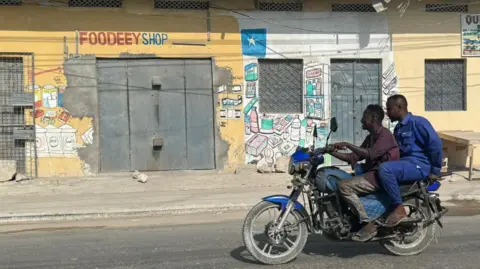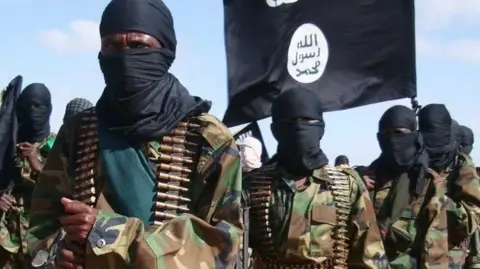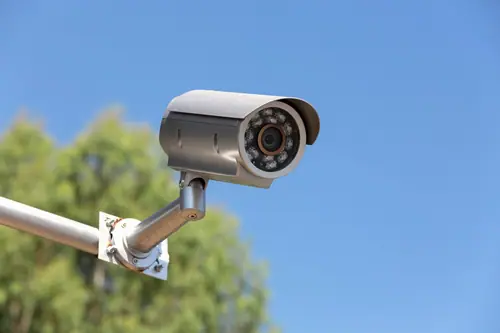Shop owners in Somalia's capital, Mogadishu, are caught between a rock and a hard place over a government directive that they install CCTV cameras outside their businesses to intensify surveillance of Islamist insurgents who have a strong presence in the city.
The businessmen say if they put up the cameras they risk being gunned down by the al-Shabab insurgents, and if they do not, they could be arrested by the police.
The BBC has changed the names of the businessmen and homeowners for their own safety.
"The CCTV cameras are why you now see me at home," says former shop-owner Hamza Nuur, 48, as he sits on a sofa holding one of his children.
He tells the BBC that he took the painful decision to sell his business to avoid incurring the wrath of either side.
"You're told not to remove the cameras by one side and then you're told to remove the cameras by the other side. Depending on the choice you make, you'll either have a bullet or prison cell waiting for you," Mr Nuur adds.
The government issued a directive last year to shop-owners to install CCTV cameras - at their own cost - to deter attacks by al-Shabab.
Mogadishu's Deputy Mayor Mohamed Ahmed Diriye tells the BBC Africa Daily podcast that the decision has paid off.
"There used to be four or five bombings per month in Mogadishu but that's no longer the case," he says.
The government has now ordered residents to install the cameras outside homes and apartment blocks, raising fears among many people that al-Shabab could bring its war into their homes.
Since October, al-Shabab has killed four businessmen in 10 attacks related to the installation of CCTV cameras, according to a leading violence monitoring group, Armed Conflict Location & Event Data (Acled).
The government's directive was aimed at ultimately disrupting al-Shabab's sources of funding as it extorts money out of shop-owners, but the retaliatory attacks by the insurgents "have forced many businesses in Mogadishu's main markets to close their doors for days", Acled adds in a report published on its website.

Mr Nuur says that at first he ignored the government's directive but was forced to install the cameras after being confronted by members of the security forces.
"I tried to explain to them I was just a poor man and didn't want to get involved with the government but they got angry and began threatening me, saying they'll ruin my life," he tells the BBC.
Mr Nuur says that once he installed a CCTV camera, he began receiving phone calls from unrecognisable numbers.
"My body started shivering from the inside. I knew who it was," he says, referring to al-Shabab operatives who have a well-entrenched spy network, allowing them to get information about civilians like Mr Nuur.
Mr Nuur says he changed his number, only for a young man to walk up to him in his shop one morning.
"He lifted his shirt. He had a pistol in his waist. He ordered me to turn on my SIM card."
Mr Nuur says he acquiesced, and the phone rang, with the anonymous caller wanting to know whether "the government's demands are more important to you than ours".
"I didn't know what to do. The young man with the pistol was standing there the whole time. I was thinking, once I hang up this phone call is he going to shoot? So, I whispered a prayer under my breath," Mr Nuur adds.
He says fortunately the man "walked out of the store without incident after I hung up the call".
Mr Nuur says he decided to sell his business after two shopkeepers were gunned down in October.
"There is nothing more valuable than human life," he says.

Critical of the government's directive, Mr Nuur adds: "People trying to make ends meet are being pulled into a war against a powerful group that even the government has difficulties fighting. Just imagine how we feel as civilians."
Diriye denies that businesses are shutting down or that owners are being forced to install CCTV cameras.
However, he acknowledges that some businessmen have fears, but says the government does its best to reassure them and to protect them.
"The city is calm and business is smooth," Diriye adds.
But Asiyo Mohamed Warsame tells the BBC that masked gunmen killed her 40-year-old brother Dahir Mohamed Warsame in his shop in Mogadishu's Yaqshid district in October after he installed CCTV cameras under pressure from the security forces.
"He left behind six children, with the youngest being only four months old," she says.
Shopkeeper Ismael Hashi, 33, says he shut his business after anonymous calls from suspected al-Shabab operatives.
"They knew my name plus more. It was as if they already knew everything about me," he tells the BBC.
Mr Hashi adds that he later received a call from the police telling him to open his shop - and when he ignored them he was detained for a few days before being released.
Mr Hashi says he has now reopened his business.
"I still have the CCTV cameras installed on the government's orders but I know the government cannot protect me if someone were to decide to take my life," he says.
"Every time I'm standing behind the counter and someone I don't recognise walks in, I get nervous and wonder if this is the person sent to kill me," Mr Hashi adds.
Sidow Abdullahi Mohamed, 39, tells the BBC that he was arrested for failing to install a CCTV camera at his home in Wajir district.
He adds that 14 other people on his street were also arrested.
"We were transferred to the Wadajir district police station where we were detained for hours. We were eventually released after someone with a government ID came and vouched for us and got us out," Mr Mohamed says.
He adds that he and the other residents have now installed CCTV cameras - but they live in fear.
"As civilians, we're forced to buy the cameras, pay to install them in our homes and risk violence from al-Shabaab. Is this how the government expects to win hearts and minds?"
Latest Stories
-
Sunyani West MP supports police mobility to combat crime
2 hours -
Nigeria’s dog owners hit with surging pet food prices amid cost of living crisis
2 hours -
Nigeria’s $5bn oil-backed loan from Aramco delayed by oil price drop, say sources
2 hours -
Kenyan blogger was hit and assaulted to death, autopsy reveals
3 hours -
Schoolchildren swept away as heavy floods and snow hit South Africa
3 hours -
HBO and CNN owner to split streaming and cable businesses
3 hours -
World Bank predicts worst decade for global growth since 60s
3 hours -
Austria school shooting death toll rises to 11 after victim dies in hospital
3 hours -
Eurostar plans direct trains to Frankfurt and Geneva
4 hours -
Mahama to announce tough restrictions on public officials’ perks – Felix Ofosu Kwakye
4 hours -
Gov’t making backroom efforts to end nurses’ strike – Felix Kwakye Ofosu
4 hours -
GHS signs MoU to transform career progression for Ghana Health Service Specialists
4 hours -
Farmer jailed for having sexual intercourse with biological sister
4 hours -
Bartender jailed 13 years for cannabis possession
5 hours -
Constitution Review Committee begins national consultations to reform 1992 Constitution
5 hours

